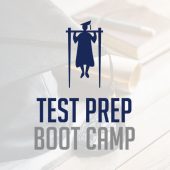Frequently Asked Questions
Should you take the ACT or the SAT?
You may have heard that certain tests fit certain people. That was true before the SAT changed in 2016. Recent experience is that most students will score just about the same on both tests the first time they take it. A few students will have scores that are significantly different for one test or the other, but most students, approximately 80% or more of the students we meet with, find out their scores for each test are about even.
How can I compare my scores?
You may have gotten advice to take each test once officially then compare the scores to figure out which one to focus on. With so many tests available online, you don’t have to spend the money to take the test or the time waiting to get back your results. In fact, you might already have a reliable SAT score to use for the comparison. If your PSAT is relatively recent, all you need is an ACT.
You can use this link to get the official practice guide available from ACT. If you don’t have a recent PSAT score, use this link to get an official practice SAT as well. It does mean investing about 4 hours to complete each test. You can find some tests that claim to be a diagnostic in one exam. It might be great that they help you save time, but if you want the most reliable results possible, we recommend using official material from the test sources.
The official tests above include answer keys and charts to help you convert your raw score to the composite score. Once you have reliable results, you can use our comparison chart to see how they match up. Look at where the two score intersect. If they land in one of the blue sections, it indicates that you should focus on that test. If they land in the gray section, and most do, you can choose the test you prefer.
How do I choose between the two tests if my scores match up?
Part of your choice will come down to which test you preferred. The biggest difference between the two tests today is the time. The two tests are only about 10 minutes different in time, and that difference is because of the essays. The simplest comparison is in the number of questions in each test: the ACT includes 215 questions and the SAT includes 154 questions. You have significantly more time to complete each question on the SAT than you do on the ACT. If you’re having trouble answering all of the questions, the SAT may be the better test for you.
If finishing all of the questions isn’t a problem for you, the next comes down to content. The ACT includes a Science section. It’s more about reasoning than science, but it will require you to do extra work to prepare for that section. In addition, the Math and English sections on the ACT cover more concepts than the comparable Math and Writing sections on the SAT. Many students feel the passages on the Reading section of the SAT are more difficult, and the SAT includes “Command of Evidence” questions that will ask you to find the best evidence for the answer to another question. They take practice, but many students have trouble getting over the initial difficulty with this unfamiliar type of question.
You have to decide which obstacle you want to overcome to decide which test you want to focus on.
When is the best time for me to take the tests?
Let’s start with the fact that most students these days take the tests twice. When the recommendation was to take both once and compare, students set themselves up to take three tests. By using available online tests, you can cut out one of those already.
After that, you need to decide when it’s the best time for you to take your first test, and the possibility of taking a second test if needed. Much of that decision depends on when you complete Algebra II or your school’s equivalent. The Math sections on both tests are based on concepts you’ll learn in that class either directly or as a foundation for more advanced ideas. If you complete the class your Sophomore year, we recommend taking your first test in December of your Junior year and the second one the next March or June.
If you won’t complete the class until your Junior year, we recommend the February (ACT) or March (SAT) tests for your first one and June for your second one.
We also recommend giving yourself some time between tests to do additional preparation. With either test, you’ll get your scores back about 2 weeks after your test date. Taking tests close together won’t give you much time to practice and prepare if you need to. Besides, the goal is to take the test just once. You’ll have to register for the second tests before you’ve even taken the first one. With the right preparation, you should only have to take the test once.
Can you "hack" the tests?
Some of that depends on what you mean by “hack”. If you mean finding a shortcut so that you can manufacture artificial scores, then no. In addition, the risks aren’t worth it. While the system may seem unfair in some ways, the reality is that these tests are the best way colleges have to find out how student preparation compares from across the country. With 2 million students applying to college every year, they need a way to make a consistent comparison.
If you mean finding a way to answer questions accurately even when you might not completely understand the question, then yes, you can “hack” these tests. The questions are written by people, and they follow some predictable formats. In addition, we have a clear idea of the types of questions that will be asked and the types of content that will be covered. Many students discover that by learning what some might consider shortcuts they actually do a better job of understanding concepts they struggled with before.
You’ve been in school for 10 or so years already. No short-term program the weeks before you take a test is going to take the place of developing disciplined study habits over the decade you spend learning before you take the tests. In fact, you’ll get more out of those courses if you’ve developed those reliable study habits than if you’re trying to change those habits ANDlearn new strategies.
The best news is that you can start learning any time. Some students even find the problem-solving nature of test preparation a trigger that spurs them on to more learning. If you have already developed solid study habits, they’ll pay off for you even more. If you haven’t, you can start now and they will pay off for you into college and beyond.















































































